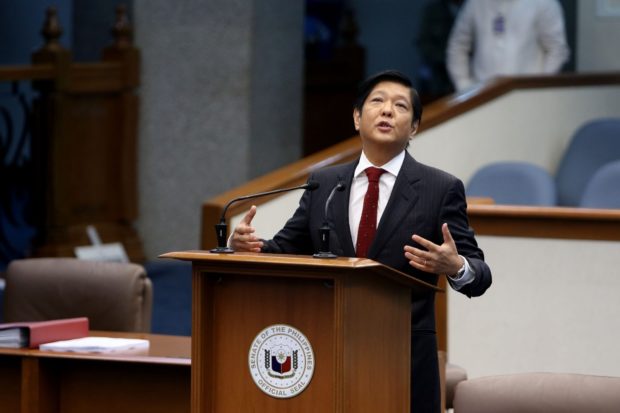PH may not be ready for federalism — Bongbong Marcos

Senator Ferdinand “Bongbong” Marcos, Jr.
INQUIRER FILE PHOTO / RICHARD A. REYES
BATAC CITY — The country may not be ready yet to shift from the present unitary presidential government to a federal and parliamentary form of government, former Sen. Ferdinand “Bongbong” Marcos Jr. said here on Saturday.
Marcos said he has yet to see a definitive government template that would make a shift to a parliament efficient and acceptable to the people.
“For example, how would you form the states? If [the process is] by administrative regions, then we may become, say an Ilocano state,” he said.
But that would affect the political structure in each of the Ilocos region’s provinces, towns and cities, he said.
“If somebody had been chosen to head a state, how will you tell, for instance, Governor Imee [Marcos] that she will no longer be the one to be followed but the head of the state?” said Marcos, who ran for Vice President last year but lost to Leni Robredo.
Article continues after this advertisement“It has become that way because this system has long been with us,” he added.
Article continues after this advertisementFederalism was not new to the country, Marcos said, because it was adopted by his father, former President Ferdinand Marcos, when the Interim Batasang Pambansa was created.
Marcos said he has yet to see a process that would work as a transition from the present system to a federal system.
“It might be that we just need a very strong political will, and I think we can all agree that President Duterte has shown the political will to achieve what he feels is necessary,” Marcos said.
“I think the federated system is not a bad system. It’s a good system that we need to examine how applicable it is to the Philippine situation.”
According to him, a federal system would grant more powers to the federated states.
“Why is that a good thing? Because the local officials understand better the problems in the communities than the leaders based in Manila,” he said.
“They have a better idea as to the conditions of the local community, better idea on how to solve the problems,” he said.
Proponents of federalism “who are putting together the process, the transfer to federalism,” need to examine many aspects, including economic and political issues, Marcos said.
“There are still a lot of work to be done. And as I said, it is really not a conceptual question that [needs answers] but what is now is the practical transition period,” he said.